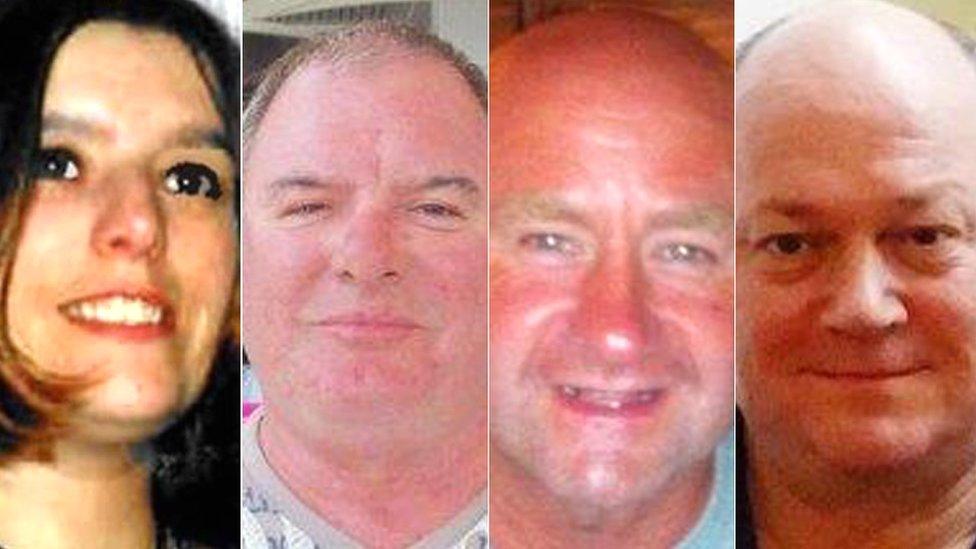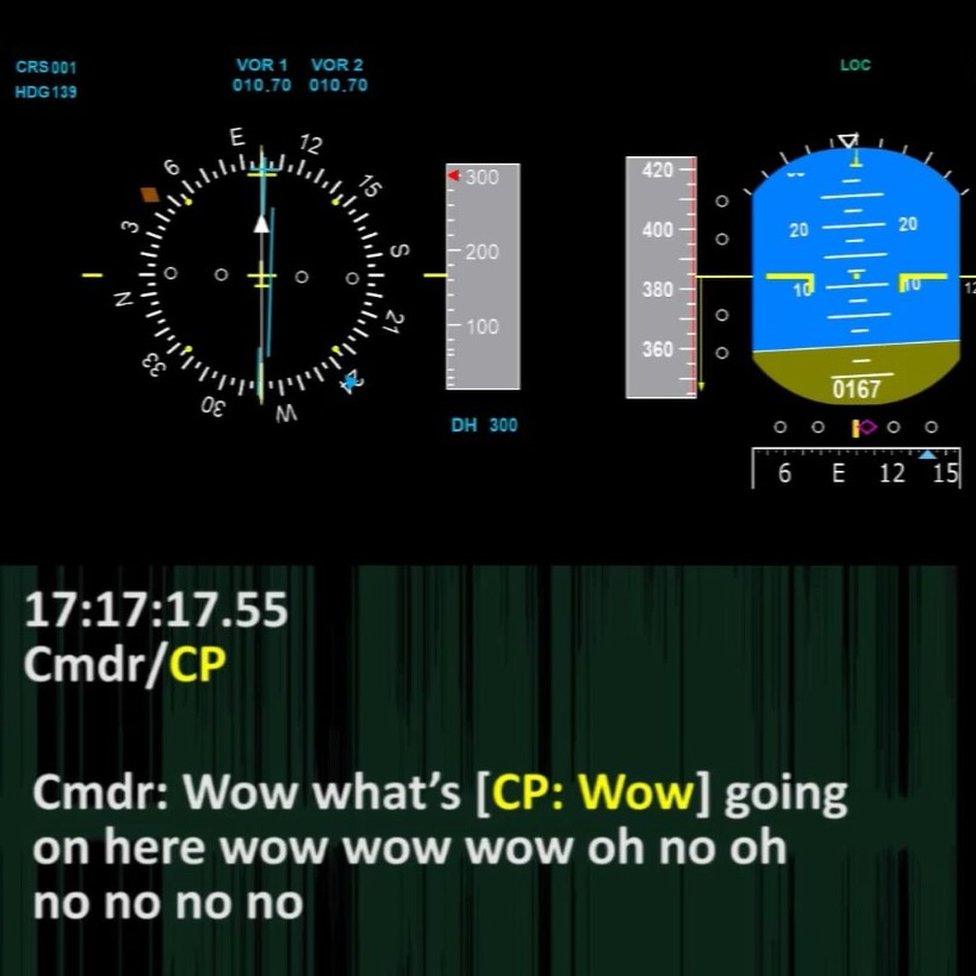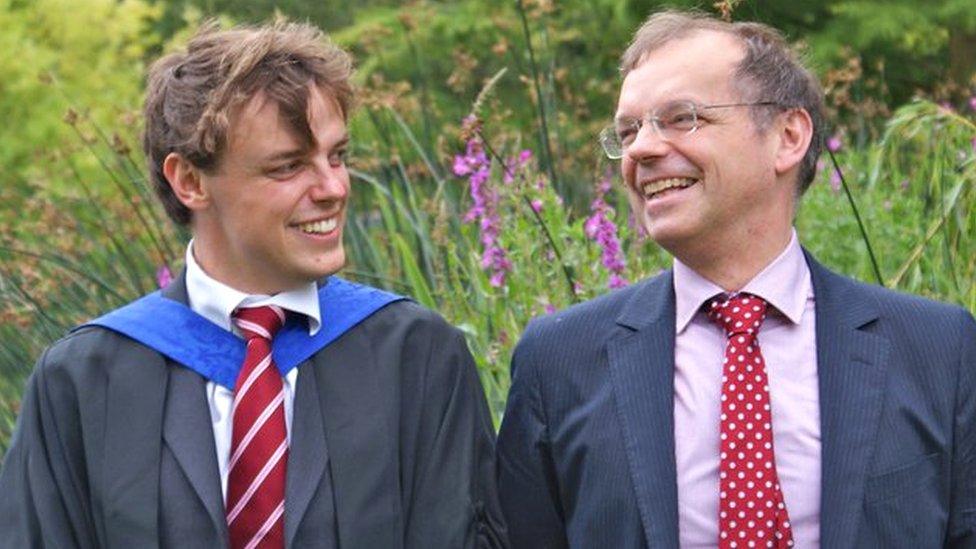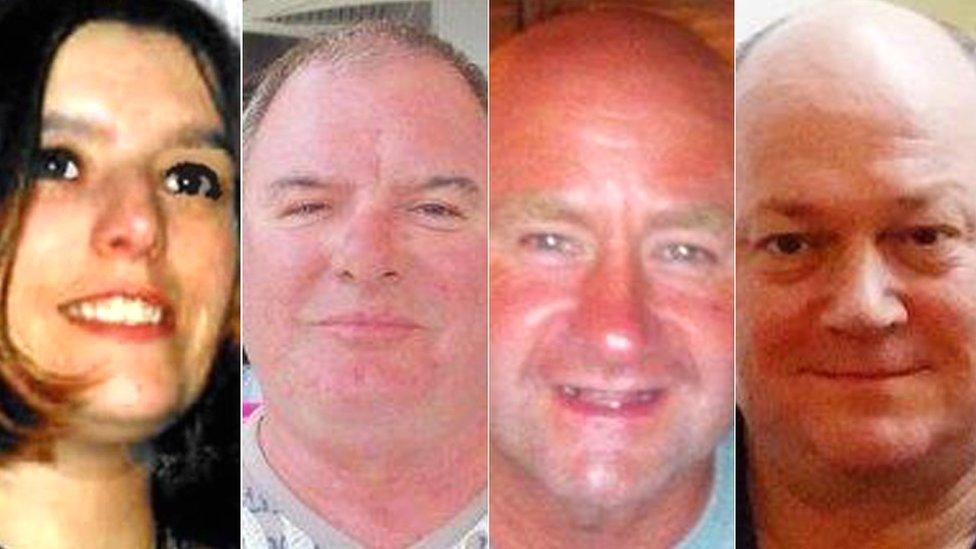Inquiry says pilot error caused fatal Shetland helicopter crash
- Published

Four passengers lost their lives in the crash
An offshore helicopter crash in which four people died was caused by pilot error, an inquiry has ruled.
Sheriff Principal Derek Pyle said the Super Puma had not maintained the correct speed as it approached its landing in Shetland in 2013.
He said the reason for the error remained unknown - but that there had been "no wilful neglect" by the pilot.
A total of 18 people were on board when the helicopter hit the sea on its approach to Sumburgh.
The Super Puma overturned and filled with water, but it did not sink due to its flotation devices.
Sarah Darnley, 45, from Elgin; Duncan Munro, 46, from Bishop Auckland; and George Allison, 57, of Winchester, drowned in the accident.
Gary McCrossan, 59, from Inverness, who had cardiac disease, died from heart failure following the crash.
The inquiry also heard that one survivor, Sam Bull, took his own life four years later aged 28 after suffering post-traumatic stress disorder (PTSD).
Pilot Martin Miglans and co-pilot Alan Bell were among those who escaped.

The Super Puma crashed into the sea in 2013
Mr Bell was praised during the inquiry for being able to arm the flotation devices before impact with little warning.
In his findings, external, Sheriff Principal Pyle said the cause of the accident had been pilot error, but the reasons for this remained unknown.
"At the end of the day we know that for whatever reason or reasons the commander failed to maintain the target approach speed," he said.
He said one possible reason was in the developing knowledge of the inability of the human brain to monitor flight instruments continuously.
"There was plainly no wilful neglect," he added.
"Rather, there was, as one witness described it, a perfect storm of circumstances which resulted in all the safety barriers in place not preventing - or remedying - his one failure, to maintain the correct speed."

A transcript of the cockpit voice recorder in the moments before the crash was shown at the inquiry

During the inquiry Martin Richardson, for the Crown, argued that the accident had been caused by a failure to maintain the helicopter's target approach speed.
He said that failure arose because the flight instruments were not effectively monitored by the flight crew, and that the Crown believed the "principal cause" was pilot error.
The inquiry heard differing opinions about the effectiveness of the submerged escape training which was undergone by the crew and passengers on North Sea flights.
Sheriff Principal Pyle said a balance has to be struck between realism and the safety of those being trained.
"In truth it would be impractical, perhaps impossible, to provide realistic training which would ensure that passengers had sufficient experience to make a significant difference," he said.
He added: "This was a dreadful accident with long-term repercussions for the survivors and the families of the deceased which no determination by this court can properly describe.
"My condolences go, in particular, to the families of the deceased, including - lest it be forgotten - the family of Mr Bull."

The trauma led to my son's death

Sam Bull with his father Michael
Sam Bull was one of the first of the survivors to escape from the submerged helicopter after the crash.
He helped with the attempts to save a fellow passenger, who died from heart failure.
Sam's father, Michael, said he was proud of his son's actions - but that they came back to haunt him.
"That was one of his nightmares, reliving that, flashbacks - in effect he was seeing that passenger die in front of him."
Michael said his son had not been physically hurt in the crash.
"But there was clearly an injury, a big change in him, a mental injury, which ultimately led to his death."

The fatal accident inquiry, which had been delayed earlier this year by coronavirus, was described as the largest virtual fact-finding case of its kind.
The seven-year wait for the inquiry to take place had previously been described as "deplorable" by Sheriff Principal Pyle.
He said it was a "great credit" to all the legal teams involved that the hearing itself took less than the four weeks it had been expected to last.
'Cherish the memories'
The family of Sarah Darnley said in a statement: "We wish to express our gratitude to the surviving passengers who gave evidence - recounting the events of that day was very clearly a harrowing task, and our thoughts are with them as they try to rebuild their lives.
"Seven years have passed since the tragedy, but we cannot say that today brings closure for us. Sarah was a beloved daughter, sister, and niece, and we think about her every day. We cherish the memories we have, and are forever grateful she was part of our lives."
The Crown Office and Procurator Fiscal Service (COPFS) said it had been "a complex investigation" with "significant delays" which had been beyond the control of its investigators.
"Nevertheless, seven years is too long for any family to wait to gain an understanding of why such a tragedy occurred and we fully appreciate the further distress caused by such lengthy delays.
"We will continue to work with partners, in the justice system and those with specialist expertise on whom we often rely, on ways to speed up the overall process and ensure the systemic delays which occurred here do not happen again."
'Extreme environment'
Jonathan Nicholson, assistant director at the UK Civil Aviation Authority (CAA), said a major safety review had been launched in 2014.
He said breathing equipment was improved for passengers in emergencies, along with escape procedures. There were also restrictions on some of the extreme weather in which helicopters could operate in, and efforts to prevent accidents taking place.
"Offshore helicopters work in an extreme environment," Mr Nicholson said.
"But we want to make sure, working with everybody involved, that they have the safest possible measures in place for all those that use them."
The RMT union has called for a full public inquiry into the "impact of commercial pressures on the helicopter industry".
- Published14 September 2020

- Published11 September 2020

- Published10 September 2020

- Published8 September 2020

- Published7 September 2020
